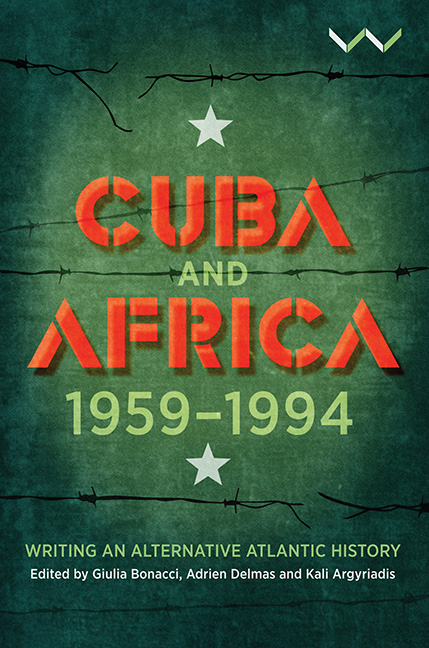Book contents
- Frontmatter
- Contents
- Figures and Table
- Foreword
- Acknowledgements
- Acronyms and Abbreviations
- Timeline of Historical Events
- Map of Africa, 1994
- Introduction Reconfiguring the Cuba–Africa Encounter
- Part I Politics and Solidarity
- Part II Trajectories
- Part III Voices
- Part IV Reconstructing History, Reconnecting Roots
- Contributors
- Index
Chapter 7 - Atlantic Voices: Imagination and sound dialogue between Congolese and Cuban singers in the 1950s
Published online by Cambridge University Press: 15 June 2021
- Frontmatter
- Contents
- Figures and Table
- Foreword
- Acknowledgements
- Acronyms and Abbreviations
- Timeline of Historical Events
- Map of Africa, 1994
- Introduction Reconfiguring the Cuba–Africa Encounter
- Part I Politics and Solidarity
- Part II Trajectories
- Part III Voices
- Part IV Reconstructing History, Reconnecting Roots
- Contributors
- Index
Summary
In 1990, Tropicana y Cubartista, a Cuban ensemble of seventy singers, musicians and dancers came to Kinshasa to pay tribute to Joseph Kabasele, the Congolese singer and bandleader of African Jazz. Several female and male singers performed Kabasele's hits, including Tabu Ley Rochereau's compositions ‘Africa elati pili’ and ‘Kaji bolingo’, singing the original version in Lingala and adapted lyrics in Spanish. The show also included a special tribute by Cuban singer Miriam Bayard entitled ‘Matanga ya Kabasele’ – matanga denoting the Congolese celebration for the end of mourning. Why, then, did a Cuban dance troupe take part in an African tribute to one of the most famous singers of Congolese rumba? Why did it seem significant to celebrate Kabasele and his African Jazz's musical work with Cuban artists singing in Lingala, Kinshasa's vernacular and musical language? Part of the answer is that the reciprocal appropriation of languages by popular singers has been a recurrent feature of Cuban and Congolese popular music.
From an African perspective, compositions sung in Spanish reflected the diffusion of Cuban music as a global phenomenon reaching international audiences from the early twentieth century. However, the Tropicana ballet's performance in Lingala also demonstrates the acknowledgement of Congolese rumba as an ‘Afro- Cuban’ creation arising from a transatlantic sound dialogue. In many ways, indeed, Congolese music can be seen as the most beautiful outcome of musical crossfertilisation between Cuba and Africa. As Congolese rumba grew in popularity throughout much of the continent, it became one of the three major sources of musical influence in Africa, along with European and American music. In Havana and Léopoldville (the colonial name of Kinshasa), the use of African languages and Spanish respectively in popular music represents an interesting case for the study of the historical formation of this ‘sound dialogue.’ By putting Congolese and Cuban musicians’ experiences in perspective, one can better understand how sounds, music and languages shaped Afro-Atlantic musical imaginaries on the eve of independence in the Belgian Congo (30 June 1960). Here, Cuban music had a significant influence ‘not only on the musical style of the country, but also onstage presentation, clothing, and even the artists’ names’.
- Type
- Chapter
- Information
- Cuba and Africa, 1959-1994Writing an Alternative Atlantic History, pp. 161 - 182Publisher: Wits University PressPrint publication year: 2020



